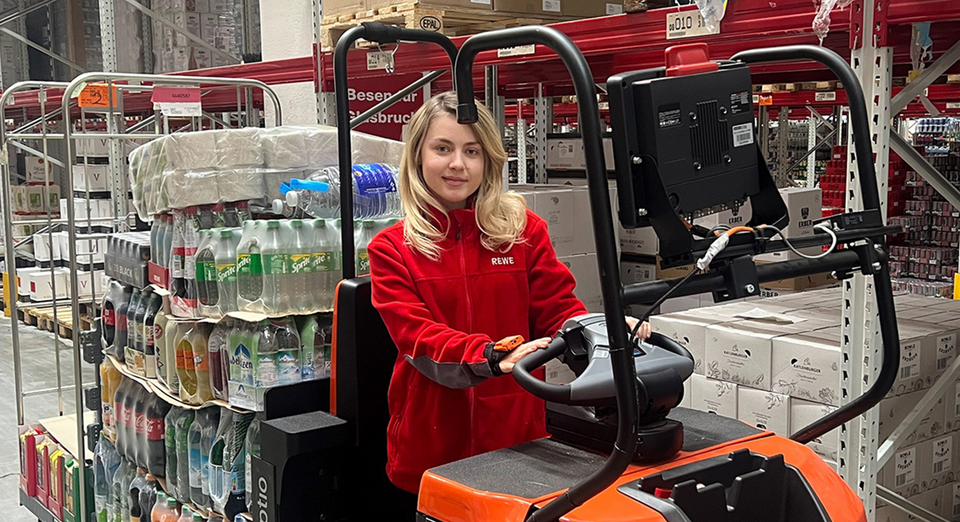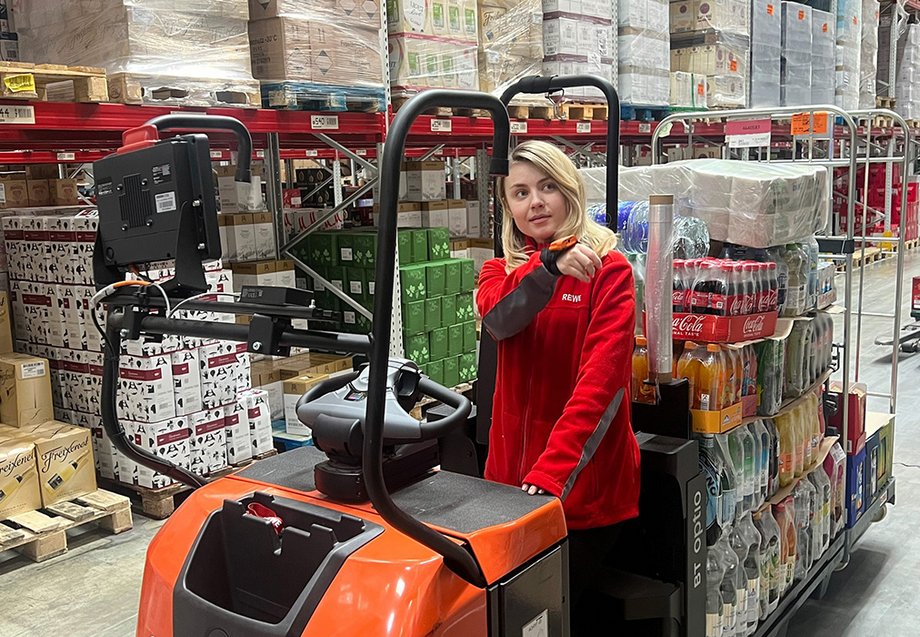
Anhelina Kirnadz is a fashion designer and public relations manager at the municipal theatre in Chernivtsi (western Ukraine) when the invasion by Russian troops begins on 24 February 2022. Today, the 26-year-old works as an order picker at the REWE logistics centre in Eitting in the southern region.
Anhelina Kirnadz tells her story in an interview with one.
one: Anhelina, thank you for your courage and your willingness to talk about your experiences. How did you experience the outbreak of war and when did you decide to leave the country?
Anhelina Kirnadz: My mum woke me up at 4 a.m. on the night of 24 February 2022 and told me that the war had started. We sat together in the flat and cried. Then the first of many air-raid sirens sounded and we had to get to safety. It wasn't that easy, because we lived in a nine-storey building without a cellar, so we had to get down the stairs and out of the house before we could go to the nearest bunker or cellar. We often had air raid alarms.
During this time, I started volunteering to make nets for our military, which helped me a little mentally because I was able to make a contribution. When you see the pictures and news, at some point you go crazy if you can't do anything.
In Chernivtsi, we weren't quite as badly affected by the attacks as the eastern Ukrainian regions. Many internally displaced persons came to us from these areas. I remember the people from Mariupol who came to us and helped us so much, despite all the suffering they had experienced.
In July, I decided to leave home.
one: Did you flee together with your family or did you set off on your own?
Anhelina Kirnadz: I am an only child and I fled alone. My parents stayed there. The older people often stay in the country because they are incredibly rooted in their home country and are very attached to their city and their work. My mother, for example, is a singing teacher and my father works for the public utility company, so he wasn't called up for military service because his job is important for the city's infrastructure and supply.
one: How did you manage to escape? Did you have a clear goal in mind of where you wanted to go?
Anhelina Kirnadz : I came by bus and I wanted to go to Germany specifically. I have a few friends here. Germany also has a reputation for not letting people down when they are in emergency situations. One problem on the journey was the wait at the Polish border, where we waited for 20 hours before we were allowed to cross. But even here the conditions were quite humane, if you can call them that - there were toilets and something to eat.
one: When you finally arrived in Germany, did you have a lot of stress with dealing with the authorities and paperwork?
Anhelina Kirnadz: It was certainly unusual that you sometimes have to wait weeks for appointments. But I was lucky. I was able to deal with all the official appointments in English and I received a very warm welcome. I am incredibly grateful for that.
one: How did you end up at REWE?
Anhelina Kirnadz: In the refugee accommodation where I was living, someone came across job vacancies in the logistics sector, particularly at the REWE logistics centre in Eitting. And that's how we were able to start here together with several people and get a job. I now work here full-time in order picking in the dry goods area and put together the goods that the stores need for sale.
one: How are you doing in this job?
Anhelina Kirnadz: It was a bit of a change at the beginning, of course, because it's more physical work compared to before. But I made a conscious decision to be independent and earn my own money. Of course, there are people who need support because there's no other way. But as long as I can work, I want to stand on my own two feet. I am very grateful to have found such a great employer. The REWE colleagues gave me a very warm welcome and familiarised me with various areas. We have good contact with each other and can also help each other with communication.
Editor's note: The entire interview was kindly translated by my colleague Oleg Berkuzki (Team Leader Fruit and Meat), who is also originally from Ukraine and has been living in Germany for some time.
one: Finally, would you like to tell us how your parents are doing? Do you have regular contact?
Anhelina Kirnadz: I speak to my parents on the phone every day. It's been almost exactly a year since the attack and they are trying to live with this new reality somehow. You have no other choice. They are rebuilding the country, which is becoming increasingly difficult at the moment because critical infrastructure such as the power supply is now also under attack. But this is war. There are no more routines and it will remain uncertain every day what will happen next.
one: Anhelina, thank you very much for talking to us!
* English Version *
Kirnadz Anhelina had studied fashion design at university and worked as a public relations manager of the city theatre in Chernivtsi in western Ukraine when the Russian invasion began on February 24, 2022. The 26-year-old now works as a picker at the REWE logistics centre in Eitting in the southern region.
In an interview with "one", Kirnadz Anhelina tells her story.
 Kirnadz Anhelina | Source: REWE Group
one: Kirnadz, thank you very much for your bravery and your willingness to share your experiences. What was it like when the war started, and when did you decide to leave the country?
Kirnadz Anhelina | Source: REWE Group
one: Kirnadz, thank you very much for your bravery and your willingness to share your experiences. What was it like when the war started, and when did you decide to leave the country?
Kirnadz Anhelina : My mother woke me at 4 a.m. on the night of 24 February 2022 and told me that the war had begun. We sat in our flat and cried. Then we heard the first air-raid sirens and had to look for a safe place. This wasn't easy because we lived in a nine-story building with no basement, so we first had to walk down the stairs and then leave the building before we were able look for a nearby bunker or basement. We heard the sirens often.
I began working as a volunteer making camouflage nets for our military, which helped me a bit mentally because I was able to do something to help. When you're seeing the images and watching the news, not being able to do anything drives you crazy.
We weren't as badly affected by the attacks in Chernivtsi as they were in eastern Ukraine. A lot of internally displaced refugees came to our area from this region. I remember the people from Mariupol who - despite all the suffering they had endured themselves - helped us so much.
It was in July that I decided to leave my home.
one: Did you flee with your family, or did you go alone?
Kirnadz Anhelina: I am an only child and I fled on my own. My parents stayed behind. Older people often stay in the country because they are so firmly rooted in their homeland, and they're very tied to their city and their work. For example, my mother teaches singing and my father works at a public utility. He wasn't called up for military service because his work is important for ensuring the city's infrastructure and power supply.
one: How did you manage to flee? Did you have a clear idea of where you wanted to go?
Kirnadz Anhelina: I got on the bus and knew I wanted to get to Germany. I know a few people here. Germany also has a reputation for helping people who are in desperate situations. One problem on my journey here was the wait at the Polish border. We had to wait for 20 hours before we were allowed to continue. But even though we had to wait, the conditions were quite "humane," if I can put it that way - there were toilets and we were offered food.
one: Did you have to deal with a lot of red tape when you finally reached Germany?
Kirnadz Anhelina: I certainly wasn't used to having to wait weeks for an appointment. But I was fortunate because I was able to conduct all of my official appointments in English and was warmly welcomed. I am incredibly grateful for this.
one: How did you end up at REWE?
Kirnadz Anhelina: Someone at the refugee facility where I was staying saw some job postings for the logistics industry, including the REWE logistics centre in Eitting. Several of us applied for positions and were hired. I now work full-time as a picker in the dry goods department, assembling the goods that are sold at the supermarkets.
one: How do you like this job?
Kirnadz Anhelina: At the beginning, it was a real change, of course, because the work was more physical than what I had done before. But it was a conscious decision for me to be independent and earn my own money. There are, of course, people who need support because they have no other option. But as long as I am able to work, I want to be able to support myself. I am very grateful to have found such a great employer. My colleagues at REWE gave me a warm welcome and made me feel like a part of the team. We work very well together and are able to help one another when it comes to communication.
Ed. note: This entire interview was thankfully translated by another REWE colleague, Oleg Berkuzki (Team Lead Fruit and Meat), who is originally from Ukraine and has lived in Germany for a long time.
one: Would you like to close the interview by telling us how your parents are doing? Are you in regular contact with them?
Kirnadz Anhelina: I talk to my parents on the phone every day. It's been about a year since the start of the invasion, and people are trying to live with this new reality somehow. There's nothing else you can do. They're rebuilding the country, which is increasingly difficult because critical infrastructure like electricity is now being attacked as well. But that's war. There are no routines anymore. We don't know what will happen from one day to the next and this uncertainty will remain.
one: Kirnadz, thank you very much for speaking with us.

Both German and English comments appear here.
Thank you very much for the interview and thank you to Kirnadz Anhelina for being willing to do this. I wish you Kirnadz Anhelina and your family lots of strength and lots of joy and kind and helpful people here in Germany.